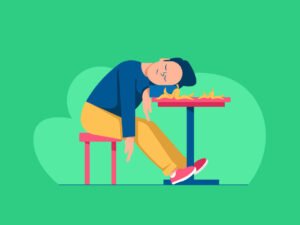Staying warm in winters comes at a cost.
Sure, the big figures on the bill are jaw-dropping, but it also comes with a wide array of other disadvantages like flaky skin, eye irritation, and nosebleed.
To help eliminate this, humidifiers are packed with just the proper moisture and warmth to keep you healthy at all times.

But do humidifiers help with sleep?
Humidifiers are known to create a warm environment so you can have a comfortable sleep throughout the night.
However, where the right humidity can elevate your sleeping experience, the wrong can yield numerous health issues.
Here is a complete guide to ensure you make the most out of these humidifiers and never fall into the pitfall of using the wrong adjustments.
So, let’s get started!
Contents
What is a Humidifier and How Does it Work?
The concept of a humidifier is as simple as it sounds: add moisture to the air. Generally, you get to have two types of humidifiers, warm and cool mist.
The cool mist uses evaporation or ultrasonic. The warm mist humidifiers use the steam from boiled water to add humidity to the room.
Now, depending on your preference, both can do wonders for your sleep. However, if you have kids at home, a cool-mist humidifier tends to be a relatively healthier choice as it has no radiation or other heating element included.
It is also known that keeping your room at the right humidity level not just helps with sleep; it can also aid breathability and ensure your nose and throat remain clear during the day.
When Should I Sleep with a Humidifier?
Winter
Considering how winter air is naturally drier than normal, we usually aggravate the problem by going for a full heated system inside the homes. This leads to the transmission of the seasonal virus (especially COVID-19) as more and more people are spending time inside their homes.
Go for warm-mist humidifiers that increase the humidity level indoors, keeping the air warm and preventing the spread of some common viruses in your region.
Summer
During the summer, the air is moist enough to keep us healthy. However, the artificial air from air conditioners can disrupt the natural humidity levels indoors, making the air drier.
Feel free to count on cool-mist humidifiers to unclog nasal passages, sinus, and throat to help you have a good night’s sleep.
How Do Humidifiers Help With Sleep?
Here are 9 benefits of humidifiers that may help with sleep:
1. Reduce Inflammation
As a general rule of thumb, dry air can cause inflammation and irritation in the eyes, nose, and throat. A humidifier is exceptionally efficient as it lets the air get to the lungs and helps you breathe in a cleaner atmosphere.
For over the years, doctors have been recommending people with weak immune systems incorporate humidifiers in their house.
2. Eliminate Allergies
The cool mist can be ideal for counteracting pollen and mold, which can play a big role in eliminating allergies.
Usually, due to the dryness in the air, you aggravate your allergic reaction like severe itching and dry coughing, which, again, can be prevented with a humidifier.
3. Help Rejuvenate While You Sleep
Sleep itself is the key to repair and rejuvenate your body and keep your immune system working properly.
However, adding a humidifier to your bedroom can further enhance its effects and naturally boost this process.
This means you are more likely to wake up with a refreshed mind every day.
4. Prevent Cold and Flu
If we look at the stats, viruses spread like fire during winter times. Why? During colder or drier weather, the viral diseases tend to be awfully contagious.
Luckily, you can control the rapid spread of germs by maintaining the right humidity levels.
How much humidity is considered “right”?
A study showed that the humidity level of 40% or higher decreases the infection level of the flu virus by more than 14%, where humidity levels of 23% retained 75% of infectivity.
5. Better Sleep for Children
Children generally have more sensitive nasal passages and are more prone to contagious diseases or viruses.
Therefore, if you have infants struggling to sleep at night with many tosses and turns or perhaps cry all night, the dryness in the air might be the problem.
Adding adequate humidity into their rooms can ensure a more peaceful sleep for the whole family.
However, make sure you are fully knowledgeable about the right humidity levels, as too much humidity can attract dust mites to cause a snag of allergies and other health problems.
It’s recommended to keep the humidity between 30 – 45%
6. Aid in Breathing
A stuffy nose and dry coughing can inevitably make it harder to breathe, directly affecting your sleep quality.
Therefore getting your hands on a high-quality humidifier can clear the nasal passage, eliminates any headaches caused by sinuses, and loosen chest congestion to yield better sleep quality.
7. Keep the Skin Moist and Healthy
Many types of heating units during winter can add up the dryness in the air and make your skin and lips dry and itchy.
Therefore, adding a humidifier to your home can become your beauty secret to prevent any cracked or flaky skin.
Sometimes, if you have your skin dry for long periods of time, it can lead to wrinkles at an early age.
In fact, according to The National Eczema Association, a humidifier acts as a barrier between your skin and any other dryness-caused conditions like eczema that can disturb your sleep patterns.
Therefore, a humidifier and treatment creams can help retain the skin moisture and promote an uninterrupted.
8. Help Keep Your Hair and Scalp Healthy
Just like your skin, your scalp can also become dry and irritated due to a lack of moisture in the air.
This may make your scalp itchy and likely to give a lifeless appearance to your hair. Considering that our hair is made up of collagen, it requires constant moisture for healthy growth and a shiny appearance.
A dry scalp could lead to brittle and damaged hair in the long run. Thus, it is not a bad idea to have a humidifier turned on while you sleep.
9. Ease Snoring and Sleep Apnea
Breathing conditions can lead to habitual snoring.
Although people with severe cases of obstructive sleep apnea might need to go for CPAP treatment, having a humidifier in your room right before you sleep can reduce the severity of your sleep apnea.
You can use a humidifier in conjunction with the CPAP treatment and check if it increases the effectiveness of the treatment.
Potential Drawbacks of Humidifiers
As with any other big change in your life, there are always a few cons that need to be considered to understand whether it is the best choice for you.
Here are some of the potential drawbacks that you can expect from humidifiers:
Requires Maintenance
Humidifiers may require you to go the extra mile to keep them in their best condition possible.
Water that’s left sittings in the device can quickly attract bacteria and mold.
As a result, they can pollute the air around you.
Legionella pneumophila is commonly found in humidifiers which can cause pneumonia.
However, bear in mind that warm mist humidifiers reduce contamination by heating the water.
Make sure you clean your humidifier regularly to help avoid bacteria growth which can play a big role in triggering your allergies.
Nowadays, you can also find a few humidifiers that are dishwasher safe to help you ensure it stays clean at all time.
As for the rest, go for what the manufacturer suggests about cleaning.
Increased Molds
Humidifiers are excellent to keep your health in check, but one thing that usually slips through the radar is that mold and dust mite is usually promoted in humid environments.
Hence, if you are allergic to molds or perhaps have asthma, this may not be the best choice for you.
Some of this mold can also leech itself to walls and ceiling to aggravate the problem.
However, you can prevent this drawback by properly educating yourself about the right temperatures suitable for household purposes.
Steam Burns
Steam burns can be caused using a warm-mist humidifier, especially in homes with children.
Therefore, it is recommended to avoid getting too close to the device.
Frequently Asked Question (FAQ)
Now that we covered the question: ‘do humidifiers help with sleep?’ let’s answer some other common questions about humidifier:
Is it bad to use tap water in a humidifier?
Not at all! Using tap water is just fine to make the most out of your humidifiers.
Considering how the device usually works up to turn the water into vapor in a healthy way, it doesn’t matter which water you use. However, distilled water has less mineral content, which reduces the risk of white mineral dust forming in your room.
How long should you run a humidifier in a bedroom?
In a nutshell, 11 to 16 hours are usually enough. This is because an average bedroom is likely to be a 700 to 900 square foot unit.
In this case, a 2 to 3 gallon of humidifier will likely take 11 to 16 hours to finish.
Bear in mind that figures can vary depending on your humidifier and the size of your room.
Can humidifiers stop snoring?
In general, humidifiers are great to drive out the dry air and replace it with a moist one.
This can lead to improving nasal congestion and eliminate some physical discomfort you may have whale while sleeping.
Another important thing is its irritation and inflammation-reducing properties that might stop or reduce the severity of habitual snoring.
So, Are You Ready to Sleep Better Tonight?
Cold and flu are killers of peaceful sleep.
That’s where a humidifier becomes your knight in shining armor to help alleviate allergies, colds.
So, coming back to the question, ‘do humidifiers help with sleep?’
A humidifier can yield great results for your health if used right.
A cool mist ultrasonic humidifier has shown better results than warm mist ones as the warm mist humidifiers include heating elements, leading to radiation drawbacks.
For this reason, it is best to consider cool mist humidifiers that are more convenient and safe to have around your home.
Feel free to add your favorite essential oils, especially lavender, to help you go to sleep relaxed.



